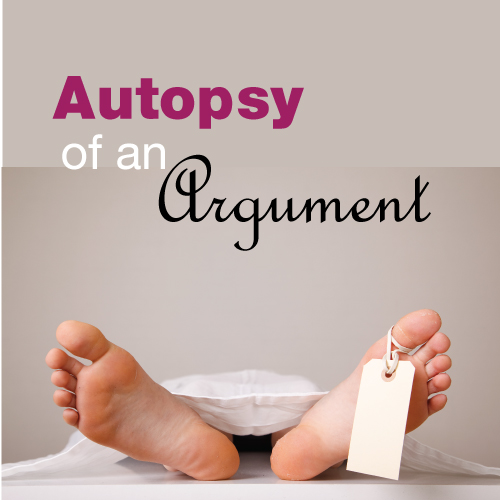Autopsy of an Argument

How do you recover from the carnage of an argument? Here’s a game plan to help you heal the rift and learn from the experience!
1. Stop:
Allow yourselves time to cool off. Separate and practice some self-soothing techniques such as deep breathing, taking a walk, having a cup of tea, meditating, consciously relaxing each part of your body etc. Pray for serenity. Agree on a time to reconnect.
2. Reflect:
Before coming together, reflect on the dominant feelings and thoughts you experienced during the argument.
A. Identify four or five feelings from the following list, thinking about the beginning and later in the argument, and how you feel now:
| irrelevant | scared | weak | overwhelmed | devalued |
| guilty | embarrassed | humiliated | stupid | ignorant |
| vulnerable | frustrated | enraged | annoyed | offended |
| rejected | despondent | hopeless | defeated | alone |
| ashamed | desperate | panicky | jealous | regretful |
| hurt | sad | gutted | shocked | flooded |
| self-loathing | out of control | inadequate | powerless | rebellious |
| hysterical | crazy | confused | indignant | outraged |
B. Identify your thoughts or perceptions:
| You didn’t like me | I needed to get you to understand me | I wasn’t being heard |
| I was being unfairly picked on | I needed to prove my case | I was misunderstood |
| I needed to win | I needed to have you agree with me | I was being insulted |
| My opinions were being ignored | I was being misjudged | I was being badgered |
| I was being patronised | I was being controlled | I wasn’t going to back down |
| I didn’t deserve this | I thought you wanted to leave me | You didn’t trust me |
| You didn’t love me | It was both of our faults |
3. Connect:
Come together and have a long hug or hold hands for a few minutes. Be aware of God’s presence.
A. Take turns to share your feelings, thoughts and perceptions deciding who will be the speaker first.
Express your answers without judgement, eg: “During the argument I felt enraged and insulted at the beginning. I kept thinking that I didn’t deserve this. Later I felt terribly alone and despondent – I didn’t know how to get you to understand. Right now I’m feeling embarrassed about my outbursts”.
The listener should avoid interrupting or contradicting the speaker; focus only on hearing and understanding the feelings and perceptions of the speaker. Replay back what you heard the speaker saying. Eg: “I can see how you thought that I was being unfair, and I understand that you were feeling insulted. I appreciate your honesty about feeling embarrassed. Is there anything else you’d like me to know?” When ready, swap roles.
B. When both spouses feel understood, analyse what happened.
- What were the preconditions?
List the things that made you or your spouse particularly sensitive or reactive, eg: being tired, hungry, stressed, feeling hurt from a previous argument, being unwell or in pain, being interrupted, distracted, late for another engagement, feeling vulnerable from an unpleasant encounter with someone else, not having enough time together etc. - What were the escalation triggers?
List the things that you or your spouse did/said that stepped up the intensity of the argument, eg: a harsh start up, criticism, name calling, contemptuous comments, globalisation (exaggerating the offence), defensiveness, stonewalling (refusing to engage ), rejected repair attempt (resisting attempts to de-escalate the argument), bringing up old wounds, not listening properly, contradicting or belittling the other, going on the attack, disrespectful comments or gestures, unloving gestures, rudeness, angry outbursts, real or threatened violence, threats of punishment or ultimatums, ignoring the other or switching off, walking out, denying the issue or responsibility, badgering/nagging etc.
C. Take responsibility for your contribution to the argument. Express your sorrow for hurting your spouse, and reconcile in your usual way, or see the notes on Reconciliation.
For deeper insight, reflect on your past, particularly your childhood: in what way did the argument trigger old wounds or frustrations? What stories in your history recall similar feelings and experiences?
More in this Series
Myths about Arguments: here
Anatomy of an Argument: here
Seven Deadly Habits: here
Autopsy of an Argument: here – this post
Reconciliation: here
Getting Help –> Counsellors: here





